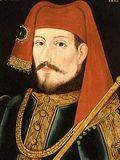 |
Henry IVb. 3 (?) Apr 1366/1367, Bolingbroke Castle, Lincolnshire [1] |
| Title: | Dei Gracia Rex Anglie et Francie Dominus Hibernie (By the Grace of God, King of England and France and Lord of Ireland) |
| Term: | 30 Sep 1399 - 20 Mar 1413 |
| Chronology: | 30 Sep 1399, acclaimed as king by an assembly of the lords spiritual and temporal and the commons of England, styled themselves Parliament |
| 13 Oct 1399, crowned, Westminster Abbey | |
| 20 Mar 1413, died | |
| Names/titles: | styled Earl of Derby by courtesy [from 1377 at least]; considered Earl of Hereford and Earl of Northampton by marriage with a co-heiress [from 22 Dec 1384]; Duke of Hereford [from 29 Sep 1397]; Duke of Lancaster, Earl of Leicester, Earl of Lincoln [from 3/4 Feb 1399] |
| Biography: | |
Henry of Bolingbroke was the oldest surviving son of John of Gaunt and grandson of Edward III. While his father was fighting for the crowns of Castile and Leon, Henry supported the Lords Appellant, who opposed the authority of his cousin, King Richard II, but later he changed sides. In 1390s Henry served with the Teutonic Order in Lithuania and traveled to Cyprus and Jerusalem. Banished in 1398 for his quarrel with the Duke of Norfolk, Henry was deprived of his lands when Richard II confiscated the estates of Lancaster upon John of Gaunt's death (3/4 Feb 1399). In July 1399, whilst Richard II was absent in Ireland, Henry landed at Ravenspur in Yorkshire. He marched across central and western England winning popular support. Richard returned to England, but was abandoned by his allies and surrendered in August 1399. On 30 Sep 1399 the Parliament that had been summoned to assemble on this date convened and approved Richard's abdication. The assembly also assented to the articles of deposition and acclaimed Henry, who claimed his right to the crown by his descent, as King of England. An attempt to restore Richard II in early 1400 cost the former king his life. In Wales Owen Glendower headed the revolt against the English and a number of expeditions sent to subdue it was unsuccessful. In 1403, Henry's supporters, the Duke of Northumberland and his son, Henry Percy (Hotspur), allied themselves with the Welsh and the party of Edmund Earl of Mortimer, who had a better claim to the throne than Henry IV. The rebels were defeated by Henry at the Battle of Shrewsbury (21 Jul 1403). Another rebellion in the north (1405), led by Mowbray and Richard Scrope archbishop of York, ended up with executions including that of the archbishop. About that time Henry began to suffer from sore disease and was forced to nominate a council (1406) and govern by its advice. With Archbishop Arundel as his chancellor, Henry still controlled the government, but in 1410 the king's son, Henry Prince of Wales (later King Henry V), assumed the real power. Although the king discharged the Prince and his supporters, the Beauforts, in November 1411, his health was failing steadily and he died in the Jerusalem Chamber after praying in the Westminster Abbey on 20 Mar 1413. [2; 3; 4] |
|
| | |
| [1] | Henry was probably born on 3 Apr 1366 — the day of the victory of Edward the Black Prince at Nájera. Also, it is possible that he was born during 1367, since in the summer or autumn of this year two messengers bringing news of the birth were separately rewarded by the infant's paternal grandfather King Edward III and his eldest son, the Black Prince. However, this might refer to another birth, that of an infant son of the Duchess Blanche, who did not survive. |
| [2] | Handbook of British Chronology (1986) |
| [3] | "Henry IV", by Bryan Bevan (The Rubicon Press, London 1994). |
| [4] | "Chronicles of the Revolution 1397-1400: The Reign of Richard II", translated and edited by Chris Given-Wilson (Manchester Univ. Press 1993). |
| [5] | Image: portrait of King Henry IV by unknown artist, late 16th or early 17th century. |
